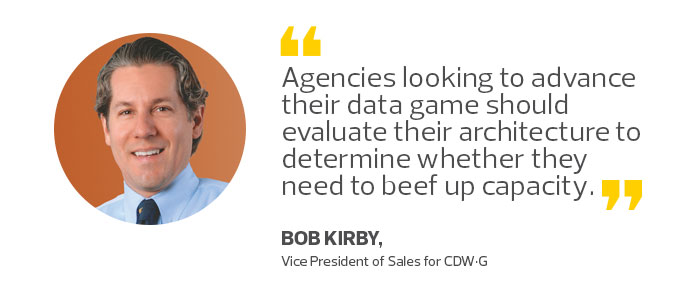With the Right Tools, CIOs Can Tap the Power of Big Data
Digital information lies at the center of effective state and local government. Leaders rely on data to make sound decisions, and citizens depend on it to access services and navigate their daily lives.
Agencies maintain thousands of data sets across multiple servers, databases and computers, making data governance practices critical to transparency, security and efficiency.
But we have entered an era of Big Data, in which our ability to collect information outpaces our capacity to tap its potential. The size of the digital universe doubles every two years, reports insideBIGDATA. As more agencies adopt the Internet of Things, the data explosion will only accelerate.
Without a strategic approach to using all of that information, governments run the risk of “becoming data rich but insight poor,” as Forbes contributor Bernard Marr recently wrote.
Foster a Clear, Clever Approach to Data
Beyond data collection, agencies should seek to act on what they learn from that information. After all, gathering and storing data has a financial cost, Marr says: dollars spent on electricity, security and compliance.
For example, smart application of data analytics could help decision-makers ensure that services to lower income communities equate to those in wealthier areas. With sensors and the right analytics, officials could monitor water quality throughout a city in real time and quickly determine deficiencies.
It’s clear that IT leaders are contemplating the data increase: In the 2016 State CIO Survey by the National Association of State Chief Information Officers (NASCIO), a majority of state CIOs said that governing and managing data play key roles in their strategic and operational plans. In 2015, less than 5 percent of CIOs said that they had formulated formal data management policies and practices, but that number jumped to 45 percent in 2016.
Unlock the Big Data Potential for Local Governments
While Big Data holds a treasure trove of possible insights, from user behavior to security threats, traditional information management systems lack the capacity to fully tap that potential. Those legacy solutions work best for structured data with rigid formats, not the large and diverse data of today. Newer software and cloud-based technology feature analytical tools that provide a comprehensive view of an enterprise’s business operations.
 Solutions help analysts extract actionable insights from sensors and the Internet of Things, and they provide easy-to-navigate dashboards and reports that allow agencies to improve citizen engagement, increase transparency, reduce costs and operate more efficiently.
Solutions help analysts extract actionable insights from sensors and the Internet of Things, and they provide easy-to-navigate dashboards and reports that allow agencies to improve citizen engagement, increase transparency, reduce costs and operate more efficiently.
At the same time, making the most of Big Data requires not only analytics software, but also robust storage, processing and networking infrastructure. Agencies looking to advance their data game should evaluate their architecture to determine whether they need to beef up capacity to incorporate more modern solutions.
The NASCIO survey revealed a promising trend: Although only about a third of states employ a chief data officer, another 20 percent may soon create such a role. In addition to managing information protection and the data lifecycle, the CDO oversees exploitation of data assets to create business value, according to research firm Gartner.
Can CDOs Come to the Rescue?
A question arises as to the relative roles of the CDO and the CIO.
“They will not, and should not, have overlapping job responsibilities,” says Debra Logan, vice president with Gartner. The CDO complements the CIO’s work by focusing on risk, compliance and policy management, and drives information and analytics strategy.
Having a C-level point person in a business role responsible for transforming data collection into action helps to bring the increasing volume under control. Doing so turns information into an asset that enhances the lives of all citizens.









